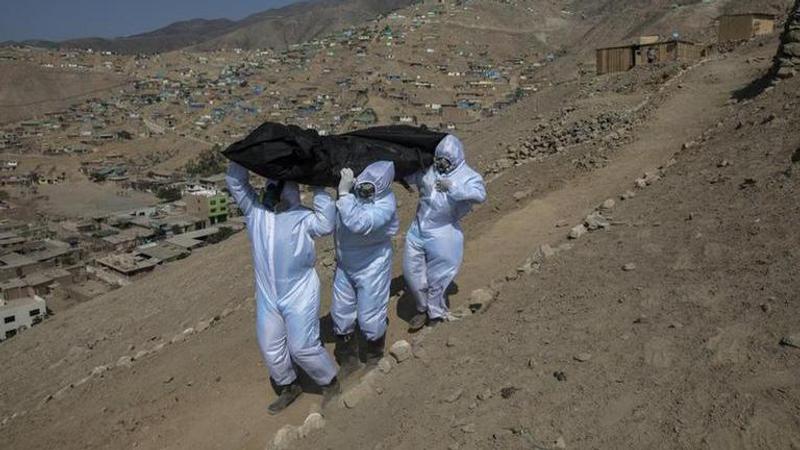Published 10:27 IST, May 21st 2020
As virus swamps Peru, Venezuelan migrants collect the dead
With the new coronavirus continuing to spread around the globe, some of the migrants who had come to Peru from neighbouring Venezuela find themselves at the frontline of the pandemic.

With the new coronavirus continuing to spread around the globe, some of the migrants who had come to Peru from neighbouring Venezuela find themselves at the frontline of the pandemic.
In Peru's capital Lima, Faneite's job includes the gruelling, dangerous work of recovering bodies of COVID-19 victims from homes.
Clad in full-body orange suits, face masks and goggles, he and his fellow workers from the Piedrangel funeral home collect as many as ten bodies a day.
"Every day I entrust myself to God so that I don't catch the disease," said Faneite, who used worked as an electrician in his native Venezuela.
He migrated to Peru in 2018 with his wife and stepson as his home country decended into a years-long economic crisis.
Peru was home to some 865.000 Venezuelan migrants last month, although a significant number have begun returning home due to lack of work during Peru's ongoing shutdown, which led to a 16.25% drop in GDP in March.
Six days a week, Faneite, Zerpa and some of the roughly 20 other Venezuelan funeral workers drive hearses through wealthy neighbourhoods overlooking the Pacific Ocean as well as through poor areas on hillsides that don't have running water.
The Piedrangel funeral home says it collected the first person confirmed to have died of COVID-19 in Peru, a psychologist who died alone in March in his apartment overlooking the ocean.
When other funeral homes refused to pick up the body, Edgard Gonzales, who owns the funeral home with his three brothers, stepped in.
Peru's government barred all non-essential movement and shuttered business on March 15, a quarantine currently expected to last until Sunday.
When soldiers and police stop the Piedrangel hearse to demand its travel permit, many recoil when informed it's carrying a likely COVID-19 victim.
More than 5,000 police have been diagnosed with the disease, with 92 deaths reported, out of a force of roughly 100,000. The army has suffered lower levels of the disease.
Faneite says he has personally handled more than 400 COVID-19 deaths since March.
When he returns home to his sleeping wife and two young children, Faneite undresses in silence, showers and washes his clothes with sodium hypochlorite disinfectant. Sometimes, he gargles with saltwater.
He says he must stay healthy for his family, including his elderly parents who remained in Venezuela.
According to the Johns Hopkins University, Peru has over 104,000 confirmed COVID-19 cases and over 3,000 deaths.
However, the number of infections may be far higher because many people have not been tested, and studies suggest people can be infected with the virus without feeling sick.
For most people, the coronavirus causes mild or moderate symptoms, such as fever and cough, that clear up in two to three weeks. But it can cause more severe illness, including pneumonia, and death for some people, especially older adults and people with existing health problems.
Updated 10:27 IST, May 21st 2020




